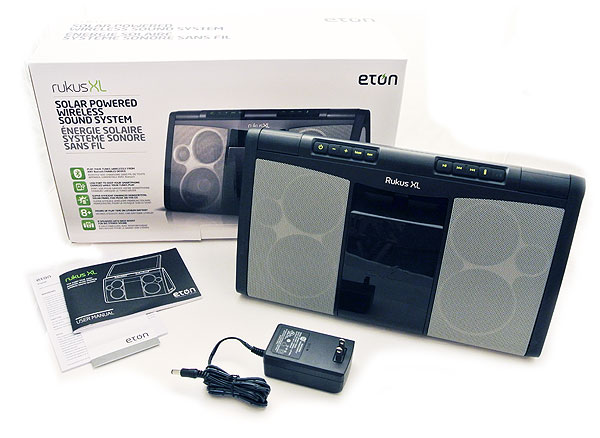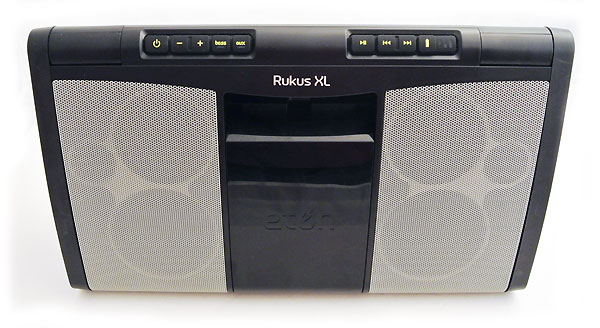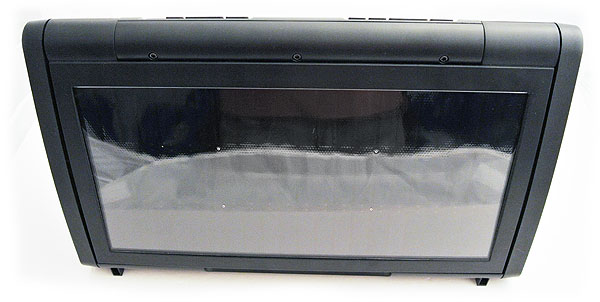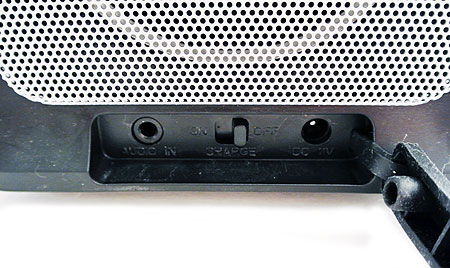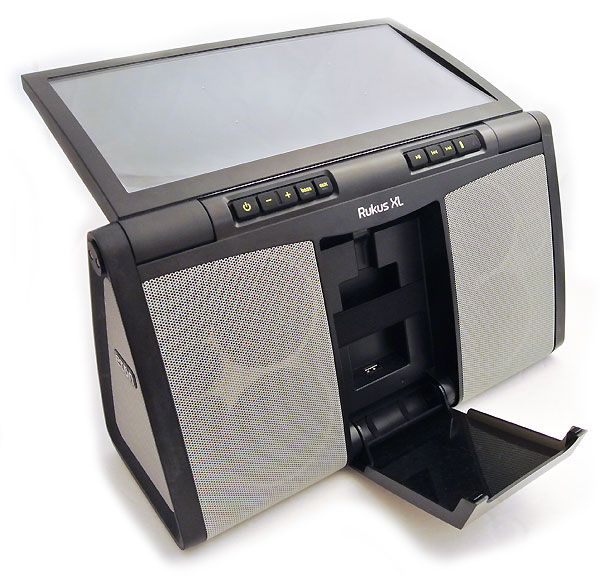Seven Portable Bluetooth Speaker Systems, Tested And Reviewed
We're testing a wide range of Bluetooth-capable speakers, priced between $50 and $250, to gauge how well these wireless audio devices fare. Believe it or not, there's a ton of differentiation, and a number of systems clearly rise to the top of our list.
Eton Rukus XL
Why you can trust Tom's Hardware
Eton isn't a common name is household audio, but the company has been around since the mid-'80s. It specializes in battery-powered audio devices able to harness alternative power sources like solar energy.
Bundle And First Impression
The Rukus XL costs $200 on Amazon. At that price, the bundle isn't particularly impressive; it includes an AC adapter and documentation. Don't let that modest list fool you though. This product is actually very functional.
It's unique-looking, to start. Eton uses a rugged black plastic frame with what feels like hard rubber around the sides. The speakers are covered by a gray metal mesh. The design is simple and attractive, equally suited to a bookshelf or campsite.
The Rukus XL measures 14.5" x 8.1" x 5.2" and weighs 3175 grams (7 lbs), making it the largest and heaviest entry into our round-up. Don't count on slipping this speaker into your backpack. It's a boombox that thankfully sports a built-in handle, though we would have liked the handle to be tackier than just smooth plastic.
A piece of soft rubber covers the control buttons, suggesting some degree of weather resistance. Eton does claim its system is suitable for outdoor use, but stops short of making any guarantees about the speakers ability to repel rain or dust. Speaking of outdoor use, though, the back of the enclosure is covered by a solar panel that deploys to charge the built-in battery. Eton claims it can fill the depleted power source in five hours given direct sunlight.
Connectivity And Controls
You can send audio to the Rukus XL through a Bluetooth 2.1 connection or a 3.5 mm audio jack. The analog input does not automatically sense a signal, so you have to press the Aux button to switch over.
This is the only product in our round-up able to charge another device connected through USB from its battery (without the AC adapter plugged in). Combined with the solar panel, you end up with some compelling possibilities. For example, you could take the Rukus XL on a sunny day trip to the lake, using it for entertainment and to keep everyone's cell phones charged up. Of course, if you prefer, USB charging can also be disabled to save power.
The USB charging point is located behind a protective compartment, giving you a convenient place to stash your phone as it charges. Eton's speaker even paired to our Android-based cell quickly via Bluetooth. It's only missing an integrated microphone, so you can't use the device for taking calls.
There are nine buttons up top: power, volume down, volume up, bass boost, auxilliary input select, pause/play, next track, previous track, and a battery life indicator.
Subjective Sound Analysis
Eton's Rukus XL delivers solid audio performance, punctuated by clear mids and crisp highs. Bass is a little subdued compared to other frequencies, but the overall sound quality is enjoyable. You may run into distortion at the highest volume level, but backing off ameliorates the issue.
Livability And Subjective Conclusion
While the Rukus XL doesn't belt out the best sound in today's competition, it's still distinctly good. The speaker's greatest strength is its utility, though. Charge the battery through an integrated solar panel while you top off your cell phone? Sure, why not? That's a great way to keep a pool party going all day long (not like you need the panel; the battery lasted almost 23 hours in our test, and that was indoors). We also measured an impressive 25-meter wireless range, which was the third-best result. If you spend equal time indoors and out, there's a good chance you'll appreciate the Rukus XL's flexibility, even at $200.
| Header Cell - Column 0 | Eton Rukus XL |
|---|---|
| Power: | 22 W RMS |
| Maximum Volume at 30 Inches: | 84 dB Line-in83 dB Bluetooth |
| Speakers: | 2 x tweeter (1" estimated)2 x woofer (3" estimated)4 x passive radiator (2" estimated) |
| Impedance: | Not Specified |
| Measured Outdoor Bluetooth Range: | 25 meters |
| Inputs: | AC charging port3.5 mm input jack |
| Outputs: | USB charging port |
| Controls: | Power buttonVolume up buttonVolume down buttonBass boost buttonAux input buttonPause/play buttonPrevious track buttonNext track buttonBattery status buttonUSB charge switch |
| Battery: | Built-in Li-ion rechargeable battery (capacity not specified) |
| Running Time at 46 dB(A), 20 inches: | Approx 23 hours |
| Dimensions: | 36.8 mm (14.5”) height20.6 mm (8.1”) width13.3 mm (5.2”) depth |
| Weight: | 3175 g (7 lbs) |
| Build Materials: | Plastic outer shell, perforated metal grille |
| Available Colors: | Black with silver-gray accents |
| Accessories: | AC charger and manual |
| Bluetooth: | Bluetooth 2.1 |
| Hands-Free Phone: | No |
| Microphone Sensitivity: | N/A |
| NFC Pairing: | No |
| Charging Time: | <3 hours |
| LED Indicators: | Charging and status |
| Warranty: | One year |
| Amazon.com Price Range: | $199 |
Get Tom's Hardware's best news and in-depth reviews, straight to your inbox.
Don Woligroski was a former senior hardware editor for Tom's Hardware. He has covered a wide range of PC hardware topics, including CPUs, GPUs, system building, and emerging technologies.
-
vmem whatever happened to really popular products like jambox and solemate? they're well within your price rangeReply -
DarkSable I run a firespinning troupe. When you're practicing routines, you HAVE to have loud, clear music, because the fire tools are spinning quickly, causing a massive amount of air turbulence with the flames, creating a very, very loud roar.Reply
In order to practice a routine with perhaps five other people on stage, you have to be able to hear the music to know where you are in the routine - otherwise someone might move too early or not move, and, well... bad things would happen.
When I founded the club, I was looking at all sorts of options; what I really wanted was a shop boombox, but they were expensive and didn't have the battery life I needed for practice... and couldn't be plugged in because you practice outside.
After reading a lot of reviews, I got the UE boombox. It has several features that were incredibly useful to me - most notable the fact that it could store three bluetooth profiles AND connect through a normal 3.5mm jack - that way we didn't have to just use my music collection, but could use other members' as well without them having to mail me the files.
Solutions we tried to use before was an iHome system, which didn't come close to having enough volume, and an old CD boombox... which worked fine, except the CDs got worn out pretty quickly as they were outdoors, and it was limiting on what music we could use - we had to have it beforehand.
So I got this UE boombox, and it was perfect. It doesn't have THE sharpest sound in the world, but it doesn't have distortion with everything turned to max volume, and it has solid base (so you can hear the beat clearly) and good battery life.
For anything requiring outdoor music that has to carry well or be particularly well, I highly, highly recommend the UE Boombox. (It would work perfectly for, say, a beach party, or something like that.) -
lp231 i was hoping you guys would also include the Creative Airwave.Reply
http://us.store.creative.com/B00COIHWVG/M/B00COIHWVG.htm -
thesuperguy The problem with this review is that they are basing their recommendations on the purely technical aspects that in the end, really don't contribute to sound quality. Ranking them based on features, range, and maximum volume is fine and all, but frequency range is not an indicator of quality. It is a very subjective thing.Reply -
cleeve Reply12155233 said:The problem with this review is that they are basing their recommendations on the purely technical aspects that in the end, really don't contribute to sound quality. Ranking them based on features, range, and maximum volume is fine and all, but frequency range is not an indicator of quality. It is a very subjective thing.
That's not true, sound quality is foremost when it comes to factors that contribute to our final recommendations.
Both subjective and objective measures of sound quality were taken into account.
We can't chart subjective sound quality but that doesn't mean you should assume it's unimportant. It's a huge part of the analysis.
-
cleeve Reply12154939 said:i was hoping you guys would also include the Creative Airwave.
http://us.store.creative.com/B00COIHWVG/M/B00COIHWVG.htm
We asked Creative for a sample and they declined to answer.
-
boogalooelectric I just bought one of these for $20 from MonopriceReply
http://www.monoprice.com/Product?ab3=b&utm_expid=58369800-11.KFcpHWqASSutMqNPOqaJVg.1&c_id=108&cp_id=10827&cs_id=1082704&p_id=7364&seq=1&format=2&utm_referrer=http%3A%2F%2Fwww.monoprice.com%2FCategory%3Fc_id%3D120%26cp_id%3D10827
I hooked them up to a pair of old cambridge soundworks 2.1 speakers and voila I have bluetooth speakers.
Monoprice has another for $45 that can also do NFC.
Also where is the JBL3 -
lp231 Reply12155607 said:12154939 said:i was hoping you guys would also include the Creative Airwave.
http://us.store.creative.com/B00COIHWVG/M/B00COIHWVG.htm
We asked Creative for a sample and they declined to answer.
I went to this shopping center one time and one of electronic stores has it on demo. It doesn't sound too bad, quite good actually, was about to get it, but its price was a bit steep during that time.
-
DarkSable Reply12156054 said:I hooked them up to a pair of old cambridge soundworks 2.1 speakers and voila I have bluetooth speakers.
Monoprice has another for $45 that can also do NFC.
I've got an NFC/bluetooth receiver for my stereo system as well. The trouble with that is that it requires two wall outlets to run - the idea behind these is you can take and use them anywhere. (I would consider them bluetooth boomboxes, rather than speaker systems.)
